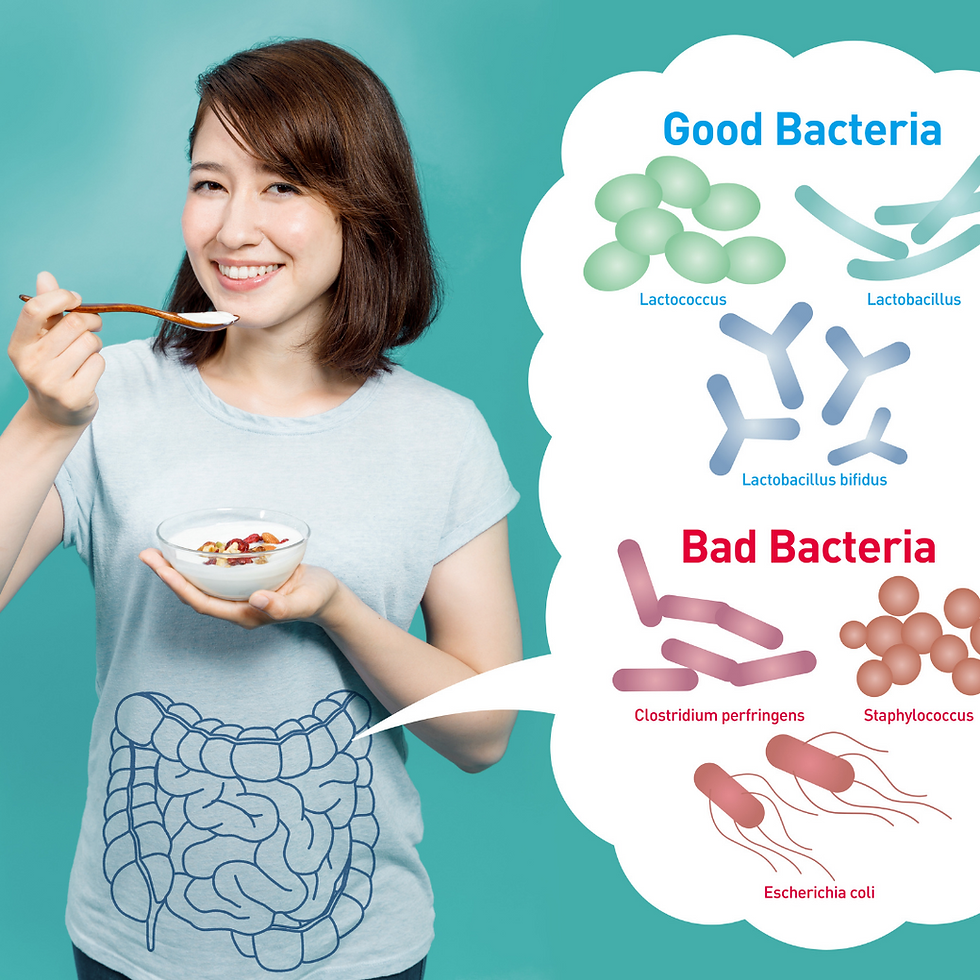Which Probiotic Strains Are Effective For Treating IBS?
- Karen

- Jan 10, 2022
- 2 min read
Updated: Jan 28, 2022
Background
Irritable bowel syndrome (IBS) is characterized by recurrent abdominal pain, bloating, and changes in bowel habits, which may include diarrhea- or constipation-predominant symptoms. Treatment guidelines for IBS recommend the use of probiotics,[1] but choosing an appropriate supplement can be challenging due to the diversity of available probiotics, the unique efficacy of different strains, and the lack of randomized controlled trials for some strains.
The study
This meta-analysis of 40 randomized controlled trials examined which probiotic strains are effective for the treatment of IBS in more than 3,000 participants. The primary outcomes were change in the global IBS-Symptom Severity Score, improvement of global IBS symptoms reported by a physician or participant interview/diaries, change in abdominal pain scores, frequency of reporting abdominal pain relief, change in bloating scores, and change in quality-of-life scores. The secondary outcome was the number and types of adverse reactions.
The results
The dosage of the probiotic was typically 1x109–1x1010 CFU/day for 4–8 weeks. There were no significant differences in the frequency or types of adverse reactions in the probiotic and placebo groups.
The following probiotics reduced the global IBS-Symptom Severity Score in at least 2 studies:
Bifidobacterium infantis 35624
Bacillus coagulans MTCC5260
A 7-strain mixture of Bifidobacterium brevis 11858BP, Bifidobacterium lactis 11903BP, Bifidobacterium longum 11860BP, Lactobacillus acidophilus 11858BP, Lactobacillus rhamnosus 11868BP, Lactobacillus plantarum 11867BP, and Streptococcus thermophilus 11870BP
A 4-strain mixture of Lactobacillus rhamnosus GG, Lactobacillus rhamnosus LC705, Bifidobacterium breve Bb99, and Propionibacterium shermanii
The following probiotics reduced abdominal pain scores in at least 2 studies:
Bacillus coagulans MTCC5260
Lactobacillus rhamnosus GG
The 7-strain mixture described above
An 8-strain mixture of Bifidobacterium breve DSM24732, Bifidobacterium longum DSM24736, Bifidobacterium infantis DSM24737, Lactobacillus acidophilus DSM24735, Lactobacillus plantarum DSM24730, Lactobacillus paracasei DSM24733, Lactobacillus delbruckii subspecies bulgaricus DSM24734, and Steptococcus thermophilus DSM24731
The following probiotics improved the reporting frequency of abdominal pain relief in at least 2 studies:
Bacillus coagulans MTCC5260
Lactobacillus plantarum 299v
Saccharomyces boulardii CNCM I-745
Saccharomyces cerevisiae CNCM I-3856
In the subgroup analysis by IBS type, the 7-strain mixture reduced abdominal pain scores in people with IBS-diarrhea. Additionally, there was no difference between adults and children in the ability of probiotics to reduce abdominal pain score.
Note
Of the 64 different types of probiotics screened, 50 had an insufficient number of randomized controlled trials to be included in the analysis. Therefore, it can’t be concluded that these probiotics aren't effective for treating IBS, but more studies are needed to validate their efficacy. Keep up to date on the latest research: https://bit.ly/3ocqYDu
Shop for your probiotics: Click Here
*When checking out, for 10% off use code: MAYO10




Comments